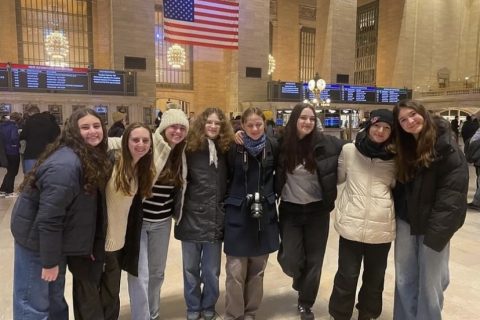by: Rafi Josselson ’25
Loud. Fun. Exciting. Competitive. These are just some of the words used to describe team sports at TLS. However, sometimes the prejudice of the outside world creeps into the court. While the reception of TLS Sports teams tends to be positive, a recent antisemitic incident has led to conversations unrelated to the game.
According to Associate Head of School Harry Pell, the league that TLS plays in, the New York State Public High School Athletic Association, has been accommodating to TLS.
“Overall, we have had a terrific reception,” Pell said. “We should remember that every team that we are playing is making some level of accommodation for us. We go pretty late in the day, and most public schools are out by then. So schools are often waiting until later in the day to play us.”
Despite the great experience teams have had, antisemitic incidents still occasionally occur. One recent incident involved the TLS boys’ varsity basketball team and their counterparts at Bronxville High School.
“We had an incident against another team, Bronxville,” Director of Athletics Scott D’Ottavio said. “Someone on the Bronxville Boys Varsity team posted a game day picture of their team and played a song by Kanye West, who is known to be antisemitic.”
These types of incidents are difficult and upsetting for the athletes involved. Sophomore Russell Wechsler is on the basketball team and had a variety of thoughts on the incident.
“I was upset for multiple reasons,” Wechsler said. “I was upset because it was the first game of the season, so I was really excited. I was upset because obviously this type of behavior should not be tolerated and it is just frustrating to see. This is the first act of antisemitism in sports at Leffell that I have encountered.”
While antisemitic incidents are extremely rare, D’Ottavio still prepares athletes and coaches for what to do in this difficult situation.
“Whoever sees something or hears something is supposed to tell the coach right away,” D’Ottavio said. “At that point, the coach is to stop the game and talk to the officials and the other coach from the other team. It does not wait until the end of the game when the memory has faded and no one remembered what was said. You really want to stop it right away.”
Afterwards, TLS administrators and their counterparts at the other school get in touch. Pell explained how TLS tries to open a serious conversation between TLS players and their opponents.
“Usually, whenever there is an antisemetic incident we set up some sort of dialogue sometimes over a meal where we can meet with the students from the other school,” Pell said. “We teach them about who we are as Jews and who we are as human beings and how hurtful antisemitic language can be. We have had some really good outcomes where the opposing team has walked away having learned something and having greater respect for us as Jews and as human beings.”
After an incident, the TLS community reflects and discusses the incidents and the reconciliation process that occurred. It can be difficult to analyze what type of antisemitism occurred and why.
“There is no such thing as good antisemitism, but the people who know all about the Holocaust and think that it was a good thing are a totally different category of antisemites than high school kids who just don’t have a lot of exposure to Jews,” Pell said. They do not have enough education yet about bias towards Jews and others. They basically say or repeat stupid things that they do not understand. When what they are saying is pointed out, they generally end up regretting it.”
Wechsler agrees with this approach. He thinks that both sides were able to resolve the incident.
“I think the schools did a phenomenal job,” Wechsler said. “I think that the superintendent, the principal and everyone who was involved all did an amazing job. They apologized quite nicely. I think that both sides understand that this is not who they are. They are not antisemites. They just had a miscommunication, a silly mistake, a stupid joke someone tried to make or whatever it was. I don’t think that anyone on either side thinks that they are antisemitic and are terrible human beings. I hope they learn from it.”
D’Ottavio also is optimistic about the results of these incidents. He feels that both sides reacted appropriately and calmly.
“As far as our kids, they do a great job of handling it,” D’Ottavio said. “They don’t fight. They do everything we ask them to do. They let us know. For the most part, I think we have always resolved any incident and solved it in a good way where there is a learning experience involved. And some of those schools that we had issues with in the past, we haven’t had an incident with them since then. So I think there was a learning lesson.”
Overall, Pell thinks that these encounters provide a reflection of the real world. He thinks that athletes and the greater TLS community reflect on how these incidents reflect the broader issue of bigotry in our modern world.
“We do ourselves a disservice when we live in a cocoon or live in a bubble,” Pell said. “I think it gives a little reminder of what the real world is like and why our identities need to be proud and strong. Also, I think that another thing that our students walk away with is really the connection between ignorance and antisemitism. Which could easily be ignorance and anti-Black racism or ignorance and homophobia or ignorance and anti-Asian bias. If our students take this lesson, they will then have the opportunity to educate others and therefore eradicate maybe not all but much of antisemitism.”


